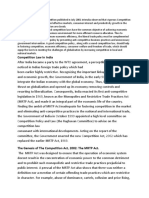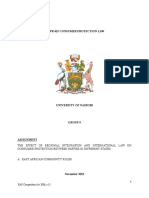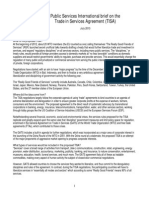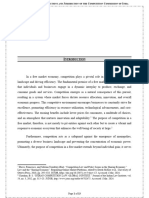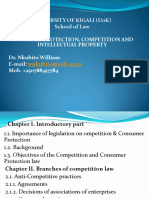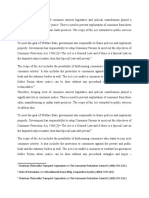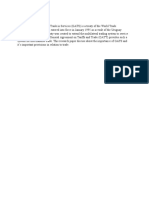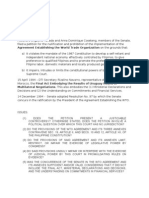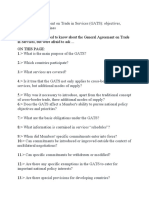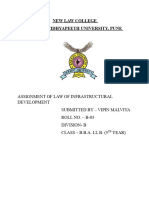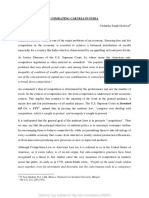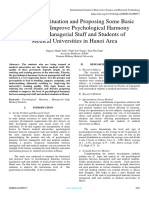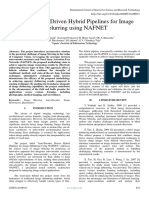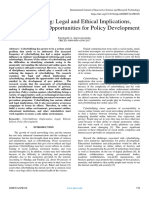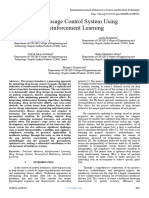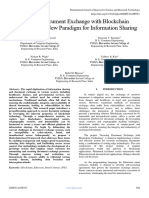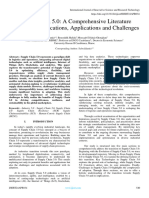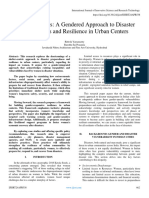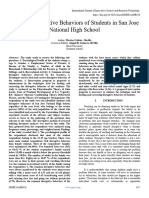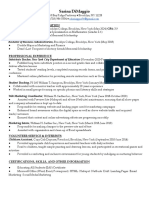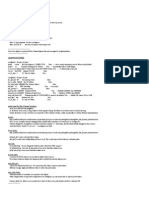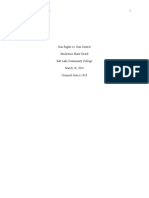Professional Documents
Culture Documents
State Aid in Relation To Services of General Interest: An Examination of Tanzanian Competition Law
Original Title
Copyright
Available Formats
Share this document
Did you find this document useful?
Is this content inappropriate?
Report this DocumentCopyright:
Available Formats
State Aid in Relation To Services of General Interest: An Examination of Tanzanian Competition Law
Copyright:
Available Formats
Volume 4, Issue 4, April – 2019 International Journal of Innovative Science and Research Technology
ISSN No:-2456-2165
State Aid in Relation to Services of General Interest:
An Examination of Tanzanian Competition Law
Sr. Ester John Kilatu [L.S.O.S.F],
LL.B (SAUT), PGDLP (LST), LL.M in Corporate and Commercial Law(UDSM), Assistant Lecturer SAUT- Arusha Centre and
Coordinator for Mobile Legal and Counseling Clinic of the Little Sisters of St. Francis of ASSISI
Abstract:- This study evaluates the influence of state aid state subsidies, under the East African Community
granted to providers of services of general interest. It Competition Act1and has in place the Competition Act and
looks at how state aid affects competition in Tanzania. sector legislation to regulate the provision of public services
The study employed a descriptive design. Simple random in transport, energy and utilities, communications and air
sampling and purposive sampling were used to obtain transportation;2There still exist imperfect competition.
data from respondents. A self-administered questionnaire
and interview were used to collect primary data. Data Studies that have been carried out in Tanzania and
was analysed using descriptive and narrative approaches. elsewhere have concentrated on effects of dominance in the
market. Only a few studies have been carried out to evaluate
Findings of this study revealed that state aid gives the effect of state aid in competition. Sector regulated
economic advantages to specific firms, discourage industries rely on State subsidies and are often characterized
investment and may create dominance leading to by lack of competition in production or supply of services
distortion of domestic and interstate competition between and have ability to raise prices. 3 The problem which this
firms. This being the case state aid is normally study investigates is whether or not State subsidies rendered
prohibited. However, it has been further observed that to providers of Services of General Interest affect
state aid is necessary to serve particular marginalised competition in the market.
community, address market failure and that it is only
prohibited under community competition laws if it does Background to the Problem
not constitute compensation. In addition, the study State authorities have been mandated to subsidize
further discovered that the East African Competition Act, provision of essential services necessary for the entire
2006, which came into force in 2014, regulates state population to access. Such services, popularly known as
subsidies whose economic consequences affect other services of general interest, cannot be supplied by the market
member states irrespective of whether all member states at affordable conditions without public intervention to offset
have enacted comprehensive competition laws and the additional cost. State intervention in terms of aid or
established institutions to that effect. It is the economic subsidies, as it is known in the competition legislation of
effect of state subsidies that affect interstate market. Tanzania,4 may distort the market if not properly regulated.
State aid regulation ensures that access to public services is
It has been recommended that states should only aid compatible to avoid distortion of competition in trade and
undertakings on services of general interest to the extent commerce.
that does not affect other firms operating in the same
market for profit making; also should assist the small and Services of General Interest (SGI) are services that
medium-sized enterprises according to the law. There public authorities classify as being of general interest and,
should be established state aid rules to regulate aid therefore, subject to specific public service obligations.5The
awards to undertaking for avoidance of overreliance on
rules established on other jurisdiction.
1
Part V of the East African Community Competition Act,
I. INTRODUCTION 2006.
2
RingoW.Tenga, Op.cit.
Tanzania like other nations is obliged to ensure the 3
United Nations Conference on Trade and Development:
availability of services of general interest to its citizens as Model Law on Competition (2010)- Chapter VII.
basic needs for an immaculate and secure living. These 4
Section 3 of the Fair Competition Act, 2003.
services depend on public State aid which finances the 5
Communication from the Commission to the European
operations of service providers. Such services would Parliament, The Council, The European Economic and
otherwise be inaccessible in the market without public Social Committee and The Committee of the Regions, “A
intervention. This has called for regulation of provision of Quality Framework for Services of General Interest in
such services to promote competition. Although the Europe”20.12.2011COM(2011) 900 final. Also Available
government of Tanzania regulates state aid, in the form of at:https://ec.europa.eu/info/topics/single-market/services-
IJISRT19AP742 www.ijisrt.com 802
Volume 4, Issue 4, April – 2019 International Journal of Innovative Science and Research Technology
ISSN No:-2456-2165
term covers both services of economic interest and non- potential aid in order to deliver timely decisions within the
economic services. Services of economic interest (SGEI) relevant business.12
include economic activities that deliver outcomes in the
overall public good that would not be supplied by the market In East Africa, the East African Community
without public intervention. 6 Non-economic services Competition Act 13 provides for partner states’ subsidies
embrace social services of general interest (SSGI). These are under Part V of the Act. It allows a member state to provide
normally provided to vulnerable citizens, based on principles subsidies to undertakings if it deems fit for public interest but
of solidarity and equal access.7 with notification to relevant authorities who determine
whether the subsidies are compatible as exemptions or
State aid exists where a state favours certain illegal.14
undertakings or the production of certain goods.8The concept
of state aid is traced back to the development of European Tanzania protects and regulates services of general
Union in 1947 under the General Agreement on Tariffs and interest through pieces of legislation, policy statements and
Trade (GATT).9 regulations. The Fair Competition Act, 15 established a Fair
Competition Commission (FCC), a Fair Competition
State aid rules become evident on ‘subsidies and aids Tribunal (FCT) and a National Consumer Advocacy Council
granted by States’ under Art.4 (c) of the Treaty of Paris.10 In (NCAC). There are also sector-specific regulators established
1957 the Treaty of Rome established the European Economic under specific statutes. In the transport sector there has been
Community (EEC) and classified state aid as state established the Surface and Marine Transport Regulatory
intervention that distorted competition. The current EC rules Authority (SUMATRA), 16 in the energy and utilities sector
regulating state aid is founded under articles 107 to 109 11 there has been established the Energy and Water Utilities
which explicitly prohibit state aid which distorts or threatens Regulatory Authority (EWURA), 17 in the communications
to distort competition by favouring certain undertakings or sector there has been established the Telecommunications
production of certain goods. The Treaty recognizes both Regulatory Authority (TCRA),18 and in the air transportation
actions in which state aid is not permitted and actions that there is the Tanzania Civil Aviation Authority
can be done within the legal limits. The rationale was to (TCAA).19These authorities have been established to provide
avoid favouring certain companies that conduct normal a robust oversight of the market20and to ensure that provision
commercial business through provision of financial support of services of general interest does not distort competition.
or lesser taxation. Provision of services by these authorities notwithstanding,
citizens still lack the choice of quality, substitute and timely
In 2012 the European Commission modernized the state essential services and facilities. State aid may thus be aimed
aid rules to require the Commission, among other things, to at protection of consumers.
avoid technicalities when examining allegations concerning
12
general-interest_en, Accessed on 5th January, 2018, at EU Modernization of the State Aid Rules, COM (2012)
11:06 hrs. 209, issued on 8th May, 2012.
6 13
Ibid. The East African Community Competition Act, 2006.
7 14
https://ec.europa.eu/info/topics/single-market/services- Section 16 and 17 of the East African Community
general-interest_en, Accessed on 5th January, 2018, at Competition Act, 2006.
15
11:06 hrs. The Fair Competition Act, No.8 of 2003.Which replaced
8
Claus-Dieter Ehlermann and Martin Goyette, “The the Fair Trade Practices Act of 1994.
16
Interface between EU State Aid Control and the WTO The Surface and Marine Transport Authority Act, 2001
Disciplines on Subsidies”, EU state aid versus WTO [Cap. 413]
disciplines on subsidies ‒ estal 4|2006, p. 695; Available 17
The Energy & Water Utilities Regulatory Authority, 2001
at [Act No. 11 of 2001].
18
https://www.wilmerhale.com/uploadedFiles/WilmerHale_ The Tanzania Communications Regulatory Authority Act,
Shared_Content/Files/Editorial/Publication/Ehlermann_G 2003 [Act No. 12 of 2003].
oyette.pdf, Accessed on 3rd March, 2018, at 16:00 hrs. 19
The Tanzania Civil Aviation Authority Act, 2003 [Act No.
9
Art. 16 General Agreement on Tariffs and Trade[1947]. 10 of 2003].
10 20
Treaty of Paris of 1951. RingoW.Tenga, Consumer Protection Model and the
11
The Treaty on the Functioning of European Union in Tanzania Legal Compliance Framework-With some
2007, formally article 87-89 of the Treaty establishing the Reference to the Communication Sector, Tanzania
European Community. Revenue Authority Workshop, June, 2009, p.2.
IJISRT19AP742 www.ijisrt.com 803
Volume 4, Issue 4, April – 2019 International Journal of Innovative Science and Research Technology
ISSN No:-2456-2165
II. HISTORICAL OVERVIEW to regulate anti-competitive practices by prohibiting anti-
competitive agreements, abuse of dominance and controlling
In 1961 Tanzania inherited a market economy which mergers and acquisitions. Proper enforcement of the Act
prevailed up to 1967 when the country embarked upon would protect consumers. Indeed, provision of state aid
nationalization policy under the Arusha Declaration. The would also assist in protection of consumers.27
Declaration promulgated the policy of socialism and self-
reliance. Following the Declaration all major means of In the East African Community, state aid is regulated
production were nationalized. The aim behind the measures under the East African Community Competition Act. 28
that were taken was to ensure that Tanzanians benefitted Despite efforts to enhance fair competition, provision of state
from their resources. Private ownership of means of aid to specific undertakings distorts competition.
production including industries was discouraged.21To foster
this aim Tanzania enacted many pieces of legislation to Legal Framework on State Aid in Relation to services of
relinquished the state control through structural reforms General Interest
including the Price Regulation Act 22 however the state The government as a trustee of its citizens is required to
continued to play a decisive role in how had to be conducted ensure provision of essential services necessary for the
in the country.23 survival of its citizens. Competition laws and institutions,
among others, ensure that providers of services of general
By mid-1980’s Tanzania relinquished state control by interest adhere to fair competition and consumer protection.
embarking on liberalization of economy which entailed
privatization and deregulation under the regime of His A. The Constitution of the United Republic of Tanzania of
Excellence Alli Hassan Mwinyi who opened the doors for 1977
private investors. Liberalization of the economy necessitated The Constitution of the United Republic of Tanzania,
taking steps to control anti-competitive practices in order to by necessary implication, permits state subsidies and aid to
protect both the consumer and the economy. providers of basic goods and services. Article 14 of the
Constitution of the United Republic of Tanzania provides for
In line with liberalization and nursing competition in right to life. This implies that, every person has the right to
1989 the Price Regulations Act of 1973 was repealed. This good health. In order to have good health a person needs
step was one of the major reforms that were undertaken after quality food and other basic necessaries. This, in turn,
the decline of the economy in 1980’s. Subsequently, a requires protection of consumers against goods and products
taskforce was established in 1990’s to probe on the which are hazardous to health. To this end, the state funds
weaknesses of the economy and advice on how to regain and providers of services related to health, utilities, education and
develop the country’s economy. 24 The team came up with economic empowerment of the citizenry as the basic
recommendations among others to enact the Fair Trade responsibility of the state to ensure quality goods and
Practices Act.25 services in a fair market. 29 These rights complement each
other.
The Fair Trade Practices Act of 1994 was the first
Competition law which outlawed anti-competitive B. The Fair Competition Act30
agreements, mergers and acquisitions and abuse of The Fair Competition Act of 2003, prevents anti-
dominance. Among its weaknesses was to confer enormous competitive agreements, abuse of dominance or market
powers to the minister including the power to fix prices. The power and controls mergers and acquisitions with the aim of
Act further lacked territorial application which would protecting consumers. It regulates all sectors of the economy
enhance economic efficiency. Due to these shortfalls except specified sectors.31 Section 3 of the Act provide for
Tanzania repealed the Fair Trade Practices Act and replaced justification of state aid. The Act further establishes
it with the Fair Competition Act.26 This Act has been passed institutions vested with power to enforce competition laws,
namely the Fair Competition Commission, the National
Consumer Advocacy Council and the Fair Competition
21
Eliamini Laitaika, “Legal and Institutional Aspect of Fair Tribunal which entertains appeals from regulatory bodies and
Competition in Tanzania,” Open University Law Journal, the Fair Competition Commission.
Vol.5. No.1: 58-68, 2014, p.58.
22
The Price Regulation Act, 1973.
23
United Nations Conference on Trade and Development
(UNICTAD), “Voluntary Peer Review of Competition 27
Section 3 of the Act, provide for justification of state aid.
28
Law and Policy: United Republic of Tanzania Overview, The East African Community Competition Act, 2006.
29
United Nations New York and Geneva, 2012, p.3. Article 11, 14 and 18 of the Constitution of the United
24
Eliamini Laitaika, p. 59. Republic of Tanzania of 1977 as amended.
25 30
The Fair Trade Practices Act of 1994. No. 8 of 2003.
26 31
No. 8 of 2003. Section 96 of the Act.
IJISRT19AP742 www.ijisrt.com 804
Volume 4, Issue 4, April – 2019 International Journal of Innovative Science and Research Technology
ISSN No:-2456-2165
C. The Energy Subsidy Policy32 competition the Authority is enjoined to notify the partner
The policy provides for energy subsidies which are state. If the partner state is aggrieved it may appeal to the
granted by the government to minimize the cost of energy court.
production which may allow setting of affordable prices to
customers. The policy establishes rules to guide both the Definition of Concepts
government and other sector undertakings when making
decisions on where to allocate resources based on specific A. State Aid
areas of priority. State aid “is when the public organization selectively
supports certain enterprises or industries, financially or by
D. The Energy and Water Utilities Regulatory Authority other means”.39State aid means measures granted by a state
Act33 or through state resources in whatever form. 40 The same
The Act, among others, regulates electricity prices or definition of state aid is stipulated under Articles 87 and 89
tariffs. It approves Tariff (D1) which is intended to benefit of the former Treaty establishing the European Community41
consumers using less than 75 kWh per month. The and Article 107 and 109 of the Treaty on the Functioning of
government compensates the reduction incurred by the European Union.42
TANESCO in effecting such reduction rendered to
marginalized customers. 34 TANESCO offers a fair price of The concept of State aid is wider than the concept of
100/=Tshs per unit to customer under tariff (D1) and subsidy because it goes further than grant of donation in form
implement standard power purchase to small firms who of subsidies or grant, but rather concerns all measures which
produce less than 10 MW. These firms sell to TANESCO at a alleviate the undertakings cost.
higher price compared to production price. The rationale is to
promote investment. However the government has not The rationale behind regulation of state aid is to avoid
compensated TANESCO since 2015. jeopardizing the ability of undertakings to compete fairly
since state aid is a potential danger on competition,43although
E. The Electricity Act35 it may be used to save a failing firm.
The Electricity Act was established to facilitate and
regulate electricity generation, transmission, distribution, B. Services of general Interest
supply and use. It provide for cross-border trade in electricity Services of General Interest (SGI) are services that
and for planning and regulation of rural electrification. To public authorities classify as being of general interest and,
that end, cross –subsidies between customer categories have therefore, subject to specific public service
been applied. obligations.44They may cater either social or economic needs.
This study has covered those services which cater for
F. The East African Community Competition Act36 economic needs which would not be supplied without public
The East African Community Competition Act which intervention known as services of general economic interest.
came into force in 2014, regulates competition matters across They include economic activities that deliver outcomes in the
the state parties. The Act requires state parties before overall public good that would not be supplied by the market
granting subsidy or effecting merger and acquisition to notify without public intervention.45
the EACCA.37
39
G. The East African Community Competition Regulations38 The Eu State Aid rules and WTO Subsidies Agreement,
The EACC Regulations elaborate the provisions of the June, 2017.
40
EAC Competition Act. The Regulations require the EAC Art. 16 General Agreement on Tariffs and Trade[1947].
41
Competition Authority determine whether a subsidy would or 1993 formerly the Treaty of Rome of 1957.
42
would not distort or threaten competition. If it would distort (TFEU) 2009. Also see, sections 16 and 17 of The East
African Community Competition Act, 2006.
43
Rodger, B., and Macculloch, A., Competition Law and
32
The Energy Subsidy Policy Revised Draft, December, Policy in the EC and UK, 4th Edition, London and
2013. Newyork, Routledge- Cavendish, 2009, p.341.
33 44
The Energy and Water Utilities Regulatory Authority Act, Communication from the Commission to the European
Cap 414 [R.E 2002]. Parliament, The Council, The European Economic and
34
Section 24(2) of the Act, review Tariff after every three Social Committee and The Committee of the Regions, “A
years. Quality Framework for Services of General Interest in
35
The Electricity Act, No. 10 of 2008. Europe”20.12.2011COM(2011) 900 final. Also Available
36
The East African Community Competition Act. 2006. at:https://ec.europa.eu/info/topics/single market/services-
37
Section 11 of the Act. general-interest_en, Accessed on 5th January, 2018, at
38
The East African Community Competition Regulations, 11:06 hrs.
45
2010. Ibid.
IJISRT19AP742 www.ijisrt.com 805
Volume 4, Issue 4, April – 2019 International Journal of Innovative Science and Research Technology
ISSN No:-2456-2165
States have recently accorded great concern on how The aid should confer an economic advantage to specific
subsidies may be offered to public services by member undertaking or production of certain goods and services
states.46The concern has been as to how the state may fund which would otherwise not be granted under the market.
public services such as broadcasting or transportation These may not only include subsidies and grants but
services. In Altmark Case 47 the court considered the also tax reliefs or operating aid that an undertaking as a
complexity on the application of State Aid rules on Services beneficiary would have to bear. It has been noted that the
of general economic interest. It was held that where the government is authorized to provide assistance to certain
financial measure advance is regarded as compensation in providers of services for them to render quality services to its
discharging of public services then there is no State aid. In citizens at an affordable price.
order for subsidies advanced to providers of services of
general economic interest to be treated as compensation four The respondent justified the grant of subsidies to
conditions must be met: TANESCO by the government as an effort to reduce the cost
which would arise from operational cost if the provider had
Clearly defined recipient or public service mandate. not received such assistance. Currently clients using less than
Compensation must be calculated objectively. 75 kWh per month fall under Tarrif (D1) which has been
No over-compensation, i.e., it must not exceed the cost approved for subsidies by the government.
for discharging the public services.
Except for public procurement, compensation should be Further, assistance has been granted in form of grant
determined by comparison to what other economic firm in and tax exemption. These kinds of assistance are intended to
the same marked would incur. favour users of a particular fuel like kerosene. Kerosene is an
essential item by rural communities. The rationale behind
Thus some measures have been taken to avoid over- this type of assistance is to promote development goals,
compensation by maintaining transparency and accounting remedy market failure and re-distribute income to poor
systems. household especially in rural areas.
III. STATE AID DESTORT COMPETITION The measure (aid) be granted by a member state or
through state resources(State funding)
It has been found that state aid granted to providers of It has been observed that the East African Fair
services of general interest may distort competition if the Competition Act of 2006 only prohibits subsidies that distort
following criteria of state aid elaborated in Belgium v. competition. However no established rules regulating the
Commission48exist. The criteria, based on the prohibition as assessment of state funding as regulated in other jurisdiction
per Article10749and section 1650 are shown below. have been put in place. Under the European Union rules
prohibit state resources in whatever form, whether financial
A. Assistance Granted must Constitute Aid or not. The Tanzania Fair Competition Act, like the EAC
It has been observed under case law that assistance may Competition Act, does not stipulate clear criteria for abuse of
distort competition if it is a state aid. For a measure to dominance for that case we rely on rules established in other
constitute state aid the following matters, as elaborated in the jurisdiction as it was stated in Tanzania Breweries Limited v.
case of Belgium v. Commission51 must exist. Serengeti Breweries Limited and Fair Competition
Commission 52 with regard to decision from other
jurisdiction, UK, EU and India there would be no hesitation
to their application.”
As to what amounts to state aid was explained in the
case of Steinike and Weining v. Germany.53 It was said in this
case that the concept of state aid should be widely interpreted
46
Rodger, B., and Macculloch, A., p.152. to include public institution, regional, territorial, institutes,
47
Case C-280/00 Altmark Trans GmbH v. government entities which directly or indirectly control
NahverhrsgesellschaftAltmark GmbH [2003] ECR I- public administration. State resources include state funds or
7747; [2003] 3 CMLR 12. funds for public resources or government budget to be
48
Case C-5/01 Belgium v. Commission (‘Cockerill distributed by the government, public bodies or private
Sambre’)[2002] ECR I-1191. Also see, Rodger, B., and bodies.
Macculloch, A., Competition Law and Policy in the EC
and UK, 4th Edition, London and Newyork, Routledge-
Cavendish, 2009, p.344.
49
Treaty on the functioning of the European Union, 2009.
50 52
The East African Community Competition Act, 2006. Tribunal Appeal No. 4 of 2010 at p. 50[Unreported].
51 53
Case C-5/01. Court of Justice Judicial decision Cases C-78/76.
IJISRT19AP742 www.ijisrt.com 806
Volume 4, Issue 4, April – 2019 International Journal of Innovative Science and Research Technology
ISSN No:-2456-2165
In the Tanzania Broadcasting Corporation case the B. Assistance must affect Trade between Member States
principal legal counsel of TCRA asserted that “there were In case of over-capacity any amount of aid offered to
complaints from IPP in Tanzania which rendered the split of providers of services may be sufficient to impact negatively
TBC54 into two that is TBC1 for commercial which should on competition thus affect intra community trade. This has
not receive subsidies from the state and TBC as a public been prohibited as per section 16(1) the Eat African Fair
domain which receives subsidies from the government which Competition Act. Tanzania being a state party is subject to
does not distort competition.” Thus such separation helped to this prohibition.
avoid anti competitive practices where there are more players
in the same business line. According to Andreas Stargard, a competition and
Antitrust practitioner, the EACCA 60 oversees competition
One of the interviewees, the senior economist from the matters in the region beyond domestic boarder irrespective of
FCT, asserted that where there are many players in the same whether the partner state has in place domestic competition
line of business and when the government subsidizes one of laws or institutions.
the service providers, such subsidy distorts completion. He
further expressed that the Fair Competition Act regulates It has been found that Tanzania supports various
only matters falling under utilities; it does not regulate companies or enterprises which have the possibility of
service providers in other aspects like employment and interfering with the domestic or interstate market in areas like
gaming board.55The Act, justifies grant of aid under section Airline industries and utilities such as TAZARA, TANESCO,
356 and the Energy subsidy policy. 57 DAWASCO, TBC, health sector, and Dares Salaam bus rapid
transit. The Acting Head for anti-monopoly department at the
Selectivity FCC, expressed that, the question of abuse of dominance is
This requirement may be satisfied where aid is granted not prohibited per see rather depend on rule of reason if the
to specific economic activities, sector or firms in a particular disadvantage overweighs the advantages.
geographical area or particular nature. Respondents
expressed justification on grants of aid that, specific An acting chief air transport officer asserted that, state
undertakings need to be empowered for them to render aid advanced to local institutions affect competition, as they
services. give an advantage to such undertakings which distort or
interfere with smooth running of the market. Thus, where
Services of general interest fall under selective services subsidy is allowed within a state, a member state may take
which the state is obliged to ensure their availability to its action if such subsidy harms them, for example if it affects
citizens at an affordable price. However, this may distort barrier to entry, lack of choice, high prices and division of
competition and discourage investment among enterprises. 58 market.
There is a dearth of state aid rules to most sector C. Distort or Threaten to Distort Competition
regulated undertaking in Tanzania apart few regulated Courts have held that irrespective of the degree of
utilities such as the Energy and Water Utilities Regulatory competition in the community state aid distorts
Authority Act.59 Some sector like Airline industries have no competition. 61 According to the current EACCA Deputy
guiding rules on subsidies which leads to monopoly. State aid registrar, in April this year the authority was set to conduct
rules are necessary to create a fair and competitive market market inquiries to particular industries suspected of
field. engaging in price fixing.62The EACCA has to establish EAC
state aid rules just as required in other jurisdiction. Any
undertaking regardless of whether it receives assistance from
the state or not, will be held liable if its economic
consequence reach beyond the domestic boarder.
54
Tanzania Broadcasting Corporation. However, under the de minimis aid, normally the
55
Ntully Huggins v. MIC Tanzania Limited and Tanzania subsidy does not distort competition and the threshold does
Communication Regulatory Authority.Tribunal App. not require notification. Some member states adopt the use of
No.3 of 2012. Block Exemption Regulations to ensure aid grants are clear
56
Fair Competition Act of 2003.
57
The Energy Subsidies Policy, Revised Draft, December,
60
2013, p.1. The East African Community Competition Authority
58
Neale, A.D., The antitrust Laws of the United States, A [EACCA].
61
study of Competition Enforced by Law, Cambridge, Case 730/79 Philip Morris Holland BV v. Commission
Cambridge University Press, 1966. [1980] ECR 2671; [1981] 2CMLR 321.
59 62
The Energy and Water Utilities Regulatory Authority Act, https://africanantitrust.com/category/eac/ Accessed on
Cap 414 [R.E 2002]. 12th June, 2018 at 9:40 hrs.
IJISRT19AP742 www.ijisrt.com 807
Volume 4, Issue 4, April – 2019 International Journal of Innovative Science and Research Technology
ISSN No:-2456-2165
and transparent. There are separate rules which may apply to RECOMMENDATIONS
electricity, agriculture, transportation and fisheries. For
example in electricity industry there are exemption on The state should provide assistance to providers of
subsidy extended to compensate service operation as services of general interest to the extent that it does not affect
minimum electricity Tariff to grade D1, benefiting the poor other firms operating in the same market for profit making
rural customer. Section1763provides circumstances in which especially the small and medium-sized enterprises.
subsidies granted do not distort competition to include
assistance to small and medium-sized enterprises. Moreover, the EACCA should establish clear and
detailed guidelines on assessment of state aid prohibitions
There are undertakings like TANESCO and TAZARA and exemption in order to enhance fair competition in the
which receive state subsidies and have dominance in the interstate market and avoid overreliance on European rules
market. Dominance by itself is not illegal unless the firm on both state aid and competition regulations.
abuses its dominance. However, the legal test is on
interchangeability or substitutability of the product or Further, there should be established government policy
service. 64 The alternative product or service need not be to minimize the cost on all services of general interest.
perfect but it must serve as optional. 65 Electricity Separation of account should be preferred in cases where
Act, 66 centers all electricity distribution roles to state intervention is necessary to avoid anti-competitive
TANESCO, 67 where other electric power producers are practices where there are more players in the same business
supposed to sell to TANESCO. line as in TBC and TBC1.
IV. CONCLUSION State aid should be abolished and if need arises be
limited to avoid distortion of market; with exception to
Irrespective of the competitive nature of the market, failing undertaking vital in the economy. This will create
state aid distorts competition. Funding some undertakings equal opportunity to the business operations and allow
accords special advantage which may make them dominant participation in the activities dominated by statutory sector.
and capable of suppressing other undertakings’ operations in
the same line of business. On the other hand state aid may Domestic competition laws should be amended to
promote development goals, remedy market failure and re- include criteria for determining abuse of dominance more
distribute income to poor households especially in rural specifically section 10 of the Fair Competition Act and the
areas. Electricity Act, to allow other players to enter in distribution
market.
There is neither established state aid rules to guide the
EAC subsidies in order to enhance fair competition in the Therefore, in order to have free and fair competition, let
interstate market nor does the Tanzanian Fair Competition market price alone determine allocation and distribution of
Act, specifically stipulate for criteria for abuse of dominance resources. State aid should be granted only where there is
by state aided firms. market failure.
State aid limited under de minimis policy does not REFERENCES
distort competition. Such assistance when compared with
other firms in similar operation does not exceed what would Books
otherwise be incurred. [1]. Garth, L. (ed), Butterworth Competition Law
Handbook, 8th Ed, Great Britain, Butterworth, 2002.
Therefore, hypothesis has been proved to be true by the [2]. Neale, A.D., The antitrust Laws of the United States,
fact that state aid by its nature distorts competition for it A study of Competition Enforced by Law,
accords special advantage to certain undertaking operating in Cambridge, Cambridge University Press, 1966.
the same line of business. [3]. Rodger, B., and Macculloch, A., Competition Law
and Policy in the EC and UK, 4th Edition, London and
Newyork, Routledge- Cavendish, 2009.
[4]. Whish, R. and Bailey, D., Competition Law, 7th Ed,
New York, Oxford University Press, (2012).
63
The East African Community Competition Act, 2006.
64
Rodger, B., and Macculloch, A. p.105. Journal Articles
65
Lundrup Garth (ed), Butterworth Competition Law [1]. Ehlermann C.D. and Goyette, M., “The Interface
Handbook, 8th Ed, Great Britain, Butterworth, 2002, between EU State Aid Control and the WTO
p.588. Disciplines on Subsidies: EU state aid versus WTO
66
The Electricity Act, No, 10 of 2008.
67
TANESCO generates, transmit, distribute and supply
IJISRT19AP742 www.ijisrt.com 808
Volume 4, Issue 4, April – 2019 International Journal of Innovative Science and Research Technology
ISSN No:-2456-2165
disciplines on subsidies”, State Aid Law Quarterly 5, [13]. The Tanzania Communications Regulatory Authority
2006, pp.695-718. Act, No. 12 of 2003.
[2]. Nditi, N.N., “Efficacy of Legal and Institutional
Framework Relating to Consumer Protection in ii) European Union Treaties
Tanzania”, Eastern Africa Law Review, Vol. 42, [1]. EU Modernization of the State Aid Rules, COM (2012)
No.1,(2015 ), pp. 150-174. 209.
[3]. Kjekshus H, “Tanzania Villagization Policy: [2]. The Treaty of Rome of 1957.
Implementation Lesson and Ecological Dimensions”, [3]. The Treaty on the Functioning of European Union,
Canadian Journal of African Studies, 1977. 2007.
[4]. Eliamini Laitaika, “Legal and Institutional Aspect of
Fair Competition in Tanzania,” Open University Law iii) International Treaties
Journal, Vol.5. No.1: 58-68, 2014. [1]. General Agreement on Tariffs and Trade of 1947.
Workshop and Conference papers D. Cases Law
[1]. Tenga, W.R., “Consumer Protection Model and the i) Domestic Cases
Tanzania Legal Compliance Framework-With some [1]. Ntully Huggins v. MIC Tanzania Limited and Tanzania
Reference to the Communication Sector”, Abridged Communication Regulatory Authority, Tribunal App.
version of Consumer Protection. No.3 of 2012 [Unreported].
[2]. Paper presented by the author at the FCC’s CC [2]. Tanzania Breweries Limited v. Serengeti Breweries
Induction Workshop in Morogoro, April 2008. Limited and Fair Competition Commission Tribunal
Appeal No. 4 of 2010[Unreported].
Dissertations and Theses
[1]. Nordeman, R., “State Aid in the EU-Economic and ii) European Union Cases
Legal Aspects”, Bachelor Thesis, Lund University, [1]. Altmark Trans GmbH v. Nahverhrsgesellschaft Altmark
(2008). GmbH, Court of Justice decision in Case C-280/00
[2003] ECR I-7747; [2003] 3 CMLR 12.
Reports [2]. Belgium v. Commission (‘Cockerill Sambre’) [2002]
[1]. Communication from the Commission to the European ECR I-1191, Court of Justice decision in Case C-5/01.
Parliament, The Council, The European Economic and [3]. Steinike and Weining v. Germany, Court of Justice
Social Committee and The Committee of the Regions, decision in Case C-78/76.
“A Quality Framework for Services of General Interest
in Europe”20.12.2011COM(2011) 900 final. Internet
[1]. https://ec.europa.eu/info/topics/single-market/services-
C. Statutes general-interest_en, Accessed on 5th January, 2018.
i) Domestic Law [2]. https://ec.europa.eu/info/topics/single-market/services-
[1]. Fair Competition Act No. 8 of 2003. general-interest_en, Accessed on 5th January, 2018.
[2]. The Constitution of the United Republic of Tanzania of [3]. https://www.wilmerhale.com/uploadedFiles/WilmerHal
1977. e_Shared_Content/Files/Editorial/Publication/Ehlerman
[3]. The East African Community Competition Act, 2006. n_Goyette.pdf, Accessed on 3rd March, 2018.
[4]. The East African Community Competition Regulations,
2010.
[5]. The Electricity Act, No. 10 of 2008.
[6]. The Energy & Water Utilities Regulatory Authority,
Act No. 11 of 2001.
[7]. The Energy and Water Utilities Regulatory Authority
Act, Cap. 414 [R.E 2002].
[8]. The Energy Subsidies Policy, Revised Draft,
December, 2013.
[9]. The Energy Subsidy Policy Revised Draft, December,
2013.
[10]. The Fair Trade Practices Act of 1994.
[11]. The Surface and Marine Transport Authority Act,
2001,Cap. 413.
[12]. The Tanzania Civil Aviation Authority Act, No. 10 of
2003.
IJISRT19AP742 www.ijisrt.com 809
You might also like
- Guest Speaker SpeechDocument12 pagesGuest Speaker SpeechNorhana Manas83% (82)
- Concept Note On Advocacy Activities of CCIDocument8 pagesConcept Note On Advocacy Activities of CCIazizullakhanNo ratings yet
- A Comparative Look at Jamaican Creole and Guyanese CreoleDocument18 pagesA Comparative Look at Jamaican Creole and Guyanese CreoleShivana Allen100% (3)
- Legal Environment and Advertising EthicsDocument4 pagesLegal Environment and Advertising Ethicssangeeta makkadNo ratings yet
- State Aid Self-AssessmentDocument5 pagesState Aid Self-AssessmentCepeu MariusNo ratings yet
- Page 2049 - 2055 Highlights Importance of Competition AdvocacyDocument8 pagesPage 2049 - 2055 Highlights Importance of Competition AdvocacyFatima ZehraNo ratings yet
- Competition Law in IndiaDocument5 pagesCompetition Law in IndiaAkhila JyothinagaramNo ratings yet
- Conclusion : Draft ReportDocument5 pagesConclusion : Draft ReportShayandril SenNo ratings yet
- Need for Competition Law ExplainedDocument7 pagesNeed for Competition Law ExplainedHarshSuryavanshiNo ratings yet
- Competition LawDocument3 pagesCompetition LawjageggiNo ratings yet
- Public Procurement, State Aid and Services of GeneralDocument36 pagesPublic Procurement, State Aid and Services of Generaladelsahli140No ratings yet
- EAC Consumer Law NotesDocument17 pagesEAC Consumer Law NotesLEENIE MUNAH0% (1)
- General Agreement On Trade in Service (GATS)Document5 pagesGeneral Agreement On Trade in Service (GATS)Manoj DiwakaranNo ratings yet
- Watch Network Published A Critical Statement Which Was Supported by Over 500 OrganisationsDocument24 pagesWatch Network Published A Critical Statement Which Was Supported by Over 500 OrganisationsJayshree GopalanNo ratings yet
- Turnitin - Doc DissertationDocument54 pagesTurnitin - Doc DissertationElizabeth Karua100% (1)
- Psi Tisa Policy Brief July 2013Document3 pagesPsi Tisa Policy Brief July 2013mrwhoohooNo ratings yet
- 3 FH5 State Aid BrieDocument8 pages3 FH5 State Aid BrieImprovingSupportNo ratings yet
- Business Ethics Group AssignmentDocument14 pagesBusiness Ethics Group Assignmentrajiv24_usNo ratings yet
- Analysis of 20151006 Annex On State Owned EnterprisesDocument11 pagesAnalysis of 20151006 Annex On State Owned EnterprisesAravindVRNo ratings yet
- Critical Analysis of Anti-Competitive AgreementDocument13 pagesCritical Analysis of Anti-Competitive AgreementAddyAdityaLadha100% (1)
- Trade LawDocument9 pagesTrade Lawkunal mehtoNo ratings yet
- Legal ProfessionDocument4 pagesLegal ProfessionReet NamjoshiNo ratings yet
- Assignment: Legal Environment of Business ONDocument5 pagesAssignment: Legal Environment of Business ONSandeep KumarNo ratings yet
- Ms 85 MamiroDocument13 pagesMs 85 Mamiroippc 7No ratings yet
- 55 SwazilandDocument4 pages55 SwazilandGabriel PotarcaNo ratings yet
- Competition Law in India - From MRTP Act to Competition ActDocument4 pagesCompetition Law in India - From MRTP Act to Competition ActankitaNo ratings yet
- Untitled 1Document8 pagesUntitled 1IsabeleBautistaNo ratings yet
- General Agreement On Trade in ServicesDocument4 pagesGeneral Agreement On Trade in ServicesGnanaganesanNo ratings yet
- Gats & Banking RegulationDocument35 pagesGats & Banking Regulationsanjaygitam2009No ratings yet
- BusinessDocument13 pagesBusinessprabhroopk789No ratings yet
- Ritika Competition FinalDocument20 pagesRitika Competition FinalRitikaNo ratings yet
- PDF Sensitization Guide On EacDocument44 pagesPDF Sensitization Guide On Eaczaa twalangetiNo ratings yet
- Philippine Chamber of Commerce & IndustryDocument2 pagesPhilippine Chamber of Commerce & IndustryArangkada PhilippinesNo ratings yet
- Business Law - Competition LawDocument16 pagesBusiness Law - Competition LawJaspreet ChandiNo ratings yet
- Why services liberalization boosts economiesDocument4 pagesWhy services liberalization boosts economiesMariam MathenNo ratings yet
- Deregulation-Agaba Innocent 2011Document8 pagesDeregulation-Agaba Innocent 2011Inno CentNo ratings yet
- Competition LawDocument3 pagesCompetition LawMARKNo ratings yet
- ASCM AgreementDocument18 pagesASCM AgreementsurajNo ratings yet
- H RPT 98-725Document94 pagesH RPT 98-725BibliohorseNo ratings yet
- Presentation Consumer Protection Day 1 8Document130 pagesPresentation Consumer Protection Day 1 8vvvs3163No ratings yet
- Open CSO Letter On Proposed "Trade in Services Agreement (TISA) "Document17 pagesOpen CSO Letter On Proposed "Trade in Services Agreement (TISA) "bi2458No ratings yet
- B2Document8 pagesB2mee myyNo ratings yet
- Palchenla SanjogDocument8 pagesPalchenla SanjogSanjog DewanNo ratings yet
- Introduction To Competition LawDocument20 pagesIntroduction To Competition LawaNo ratings yet
- Mitchell Working Paper Series: Europa InstituteDocument19 pagesMitchell Working Paper Series: Europa InstituteRevekka TheodorouNo ratings yet
- Unit - VI General Agreement On Trade in Services (GATS)Document6 pagesUnit - VI General Agreement On Trade in Services (GATS)Snigdha RajNo ratings yet
- Competition Advocacy - PDFDocument10 pagesCompetition Advocacy - PDFPrashansaNo ratings yet
- Competition Law in Pakistan Brief History Aspirations and CharacteristicsDocument21 pagesCompetition Law in Pakistan Brief History Aspirations and CharacteristicsNaba ZehraNo ratings yet
- Competition Advocacy ModuleDocument10 pagesCompetition Advocacy ModuleAyushiDwivedi100% (1)
- GatsDocument5 pagesGatsAlyssa SimićęwskáiáNo ratings yet
- The Competition Commission of PakistanDocument10 pagesThe Competition Commission of Pakistanranag28No ratings yet
- Competition Law: Name: Alvira.M Class: BA - BL (Hons) Year: IV Section: "A"Document18 pagesCompetition Law: Name: Alvira.M Class: BA - BL (Hons) Year: IV Section: "A"alviraNo ratings yet
- Supreme Court upholds Senate ratification of WTO agreementDocument7 pagesSupreme Court upholds Senate ratification of WTO agreementKrys MartinezNo ratings yet
- Unit 3Document38 pagesUnit 3Sanya KhuranaNo ratings yet
- Consumer Protection Act, 1986Document132 pagesConsumer Protection Act, 1986Md Enamul HasanNo ratings yet
- Infrastructural Research Paper by Vipin Malviya B-03Document9 pagesInfrastructural Research Paper by Vipin Malviya B-03Vipin MalviyaNo ratings yet
- Competition Law in KenyaDocument4 pagesCompetition Law in KenyaEunice NandyNo ratings yet
- N, Madyibi EconomicsDocument8 pagesN, Madyibi EconomicsNonzwakazi MadyibiNo ratings yet
- Combating Cartels in IndiaDocument10 pagesCombating Cartels in IndiaSri BalajiNo ratings yet
- Overview of Indian competition and consumer protection lawsDocument124 pagesOverview of Indian competition and consumer protection lawsSandhya KandukuriNo ratings yet
- The Regulatory Environment: Part Two of The Investors' Guide to the United Kingdom 2015/16From EverandThe Regulatory Environment: Part Two of The Investors' Guide to the United Kingdom 2015/16No ratings yet
- Globalization Unveiled: Assessing the Impact of the World Trade OrganizationFrom EverandGlobalization Unveiled: Assessing the Impact of the World Trade OrganizationNo ratings yet
- Formulation and Evaluation of Poly Herbal Body ScrubDocument6 pagesFormulation and Evaluation of Poly Herbal Body ScrubInternational Journal of Innovative Science and Research TechnologyNo ratings yet
- Comparatively Design and Analyze Elevated Rectangular Water Reservoir with and without Bracing for Different Stagging HeightDocument4 pagesComparatively Design and Analyze Elevated Rectangular Water Reservoir with and without Bracing for Different Stagging HeightInternational Journal of Innovative Science and Research TechnologyNo ratings yet
- Explorning the Role of Machine Learning in Enhancing Cloud SecurityDocument5 pagesExplorning the Role of Machine Learning in Enhancing Cloud SecurityInternational Journal of Innovative Science and Research TechnologyNo ratings yet
- A Review: Pink Eye Outbreak in IndiaDocument3 pagesA Review: Pink Eye Outbreak in IndiaInternational Journal of Innovative Science and Research TechnologyNo ratings yet
- Design, Development and Evaluation of Methi-Shikakai Herbal ShampooDocument8 pagesDesign, Development and Evaluation of Methi-Shikakai Herbal ShampooInternational Journal of Innovative Science and Research TechnologyNo ratings yet
- Studying the Situation and Proposing Some Basic Solutions to Improve Psychological Harmony Between Managerial Staff and Students of Medical Universities in Hanoi AreaDocument5 pagesStudying the Situation and Proposing Some Basic Solutions to Improve Psychological Harmony Between Managerial Staff and Students of Medical Universities in Hanoi AreaInternational Journal of Innovative Science and Research TechnologyNo ratings yet
- A Survey of the Plastic Waste used in Paving BlocksDocument4 pagesA Survey of the Plastic Waste used in Paving BlocksInternational Journal of Innovative Science and Research TechnologyNo ratings yet
- Electro-Optics Properties of Intact Cocoa Beans based on Near Infrared TechnologyDocument7 pagesElectro-Optics Properties of Intact Cocoa Beans based on Near Infrared TechnologyInternational Journal of Innovative Science and Research TechnologyNo ratings yet
- Auto Encoder Driven Hybrid Pipelines for Image Deblurring using NAFNETDocument6 pagesAuto Encoder Driven Hybrid Pipelines for Image Deblurring using NAFNETInternational Journal of Innovative Science and Research TechnologyNo ratings yet
- Cyberbullying: Legal and Ethical Implications, Challenges and Opportunities for Policy DevelopmentDocument7 pagesCyberbullying: Legal and Ethical Implications, Challenges and Opportunities for Policy DevelopmentInternational Journal of Innovative Science and Research TechnologyNo ratings yet
- Navigating Digitalization: AHP Insights for SMEs' Strategic TransformationDocument11 pagesNavigating Digitalization: AHP Insights for SMEs' Strategic TransformationInternational Journal of Innovative Science and Research TechnologyNo ratings yet
- Hepatic Portovenous Gas in a Young MaleDocument2 pagesHepatic Portovenous Gas in a Young MaleInternational Journal of Innovative Science and Research TechnologyNo ratings yet
- Review of Biomechanics in Footwear Design and Development: An Exploration of Key Concepts and InnovationsDocument5 pagesReview of Biomechanics in Footwear Design and Development: An Exploration of Key Concepts and InnovationsInternational Journal of Innovative Science and Research TechnologyNo ratings yet
- Automatic Power Factor ControllerDocument4 pagesAutomatic Power Factor ControllerInternational Journal of Innovative Science and Research TechnologyNo ratings yet
- Formation of New Technology in Automated Highway System in Peripheral HighwayDocument6 pagesFormation of New Technology in Automated Highway System in Peripheral HighwayInternational Journal of Innovative Science and Research TechnologyNo ratings yet
- Drug Dosage Control System Using Reinforcement LearningDocument8 pagesDrug Dosage Control System Using Reinforcement LearningInternational Journal of Innovative Science and Research TechnologyNo ratings yet
- The Effect of Time Variables as Predictors of Senior Secondary School Students' Mathematical Performance Department of Mathematics Education Freetown PolytechnicDocument7 pagesThe Effect of Time Variables as Predictors of Senior Secondary School Students' Mathematical Performance Department of Mathematics Education Freetown PolytechnicInternational Journal of Innovative Science and Research TechnologyNo ratings yet
- Mobile Distractions among Adolescents: Impact on Learning in the Aftermath of COVID-19 in IndiaDocument2 pagesMobile Distractions among Adolescents: Impact on Learning in the Aftermath of COVID-19 in IndiaInternational Journal of Innovative Science and Research TechnologyNo ratings yet
- Securing Document Exchange with Blockchain Technology: A New Paradigm for Information SharingDocument4 pagesSecuring Document Exchange with Blockchain Technology: A New Paradigm for Information SharingInternational Journal of Innovative Science and Research TechnologyNo ratings yet
- Perceived Impact of Active Pedagogy in Medical Students' Learning at the Faculty of Medicine and Pharmacy of CasablancaDocument5 pagesPerceived Impact of Active Pedagogy in Medical Students' Learning at the Faculty of Medicine and Pharmacy of CasablancaInternational Journal of Innovative Science and Research TechnologyNo ratings yet
- Intelligent Engines: Revolutionizing Manufacturing and Supply Chains with AIDocument14 pagesIntelligent Engines: Revolutionizing Manufacturing and Supply Chains with AIInternational Journal of Innovative Science and Research TechnologyNo ratings yet
- Enhancing the Strength of Concrete by Using Human Hairs as a FiberDocument3 pagesEnhancing the Strength of Concrete by Using Human Hairs as a FiberInternational Journal of Innovative Science and Research TechnologyNo ratings yet
- Exploring the Clinical Characteristics, Chromosomal Analysis, and Emotional and Social Considerations in Parents of Children with Down SyndromeDocument8 pagesExploring the Clinical Characteristics, Chromosomal Analysis, and Emotional and Social Considerations in Parents of Children with Down SyndromeInternational Journal of Innovative Science and Research TechnologyNo ratings yet
- Supply Chain 5.0: A Comprehensive Literature Review on Implications, Applications and ChallengesDocument11 pagesSupply Chain 5.0: A Comprehensive Literature Review on Implications, Applications and ChallengesInternational Journal of Innovative Science and Research TechnologyNo ratings yet
- Teachers' Perceptions about Distributed Leadership Practices in South Asia: A Case Study on Academic Activities in Government Colleges of BangladeshDocument7 pagesTeachers' Perceptions about Distributed Leadership Practices in South Asia: A Case Study on Academic Activities in Government Colleges of BangladeshInternational Journal of Innovative Science and Research TechnologyNo ratings yet
- Advancing Opthalmic Diagnostics: U-Net for Retinal Blood Vessel SegmentationDocument8 pagesAdvancing Opthalmic Diagnostics: U-Net for Retinal Blood Vessel SegmentationInternational Journal of Innovative Science and Research TechnologyNo ratings yet
- The Making of Self-Disposing Contactless Motion-Activated Trash Bin Using Ultrasonic SensorsDocument7 pagesThe Making of Self-Disposing Contactless Motion-Activated Trash Bin Using Ultrasonic SensorsInternational Journal of Innovative Science and Research TechnologyNo ratings yet
- Natural Peel-Off Mask Formulation and EvaluationDocument6 pagesNatural Peel-Off Mask Formulation and EvaluationInternational Journal of Innovative Science and Research TechnologyNo ratings yet
- Beyond Shelters: A Gendered Approach to Disaster Preparedness and Resilience in Urban CentersDocument6 pagesBeyond Shelters: A Gendered Approach to Disaster Preparedness and Resilience in Urban CentersInternational Journal of Innovative Science and Research TechnologyNo ratings yet
- Handling Disruptive Behaviors of Students in San Jose National High SchoolDocument5 pagesHandling Disruptive Behaviors of Students in San Jose National High SchoolInternational Journal of Innovative Science and Research TechnologyNo ratings yet
- MCQ CH 5-Electricity and Magnetism SL Level: (30 Marks)Document11 pagesMCQ CH 5-Electricity and Magnetism SL Level: (30 Marks)Hiya ShahNo ratings yet
- Chippernac: Vacuum Snout Attachment (Part Number 1901113)Document2 pagesChippernac: Vacuum Snout Attachment (Part Number 1901113)GeorgeNo ratings yet
- 1995 - Legacy SystemsDocument5 pages1995 - Legacy SystemsJosé MªNo ratings yet
- Magnetic Suspension System With Electricity Generation Ijariie5381Document11 pagesMagnetic Suspension System With Electricity Generation Ijariie5381Jahnavi ChinnuNo ratings yet
- Sarina Dimaggio Teaching Resume 5Document1 pageSarina Dimaggio Teaching Resume 5api-660205517No ratings yet
- Meesho FDocument75 pagesMeesho FAyan khanNo ratings yet
- Entrepreneurship - Quarter 2 - Week 1-3 - 4 M's of Production and - Business ModelDocument6 pagesEntrepreneurship - Quarter 2 - Week 1-3 - 4 M's of Production and - Business ModelJude Del RosarioNo ratings yet
- Good Paper On Time SerisDocument15 pagesGood Paper On Time SerisNamdev UpadhyayNo ratings yet
- AIX For System Administrators - AdaptersDocument2 pagesAIX For System Administrators - Adaptersdanielvp21No ratings yet
- 19-Year-Old Female With Hypokalemia EvaluatedDocument5 pages19-Year-Old Female With Hypokalemia EvaluatedMohammed AhmedNo ratings yet
- AIRs LM Business-Finance Q1 Module-5Document25 pagesAIRs LM Business-Finance Q1 Module-5Oliver N AnchetaNo ratings yet
- Traditional Knowledge - The Changing Scenario in India PDFDocument9 pagesTraditional Knowledge - The Changing Scenario in India PDFashutosh srivastavaNo ratings yet
- Terrestrial EcosystemDocument13 pagesTerrestrial Ecosystemailene burceNo ratings yet
- Foundations of Public Policy AnalysisDocument20 pagesFoundations of Public Policy AnalysisSimran100% (1)
- Easy Gluten Free RecipesDocument90 pagesEasy Gluten Free RecipesBrandon Schmid100% (1)
- Catalogo 4life en InglesDocument40 pagesCatalogo 4life en InglesJordanramirezNo ratings yet
- Work, Energy and Power: Checkpoint 1 (p.194)Document12 pagesWork, Energy and Power: Checkpoint 1 (p.194)U KILLED MY DOGNo ratings yet
- AIESEC - Exchange Participant (EP) GuidebookDocument24 pagesAIESEC - Exchange Participant (EP) GuidebookAnonymous aoQ8gc1No ratings yet
- Extra Grammar Exercises (Unit 6, Page 64) : Top Notch 3, Third EditionDocument4 pagesExtra Grammar Exercises (Unit 6, Page 64) : Top Notch 3, Third EditionA2020No ratings yet
- Untitled Document 3Document10 pagesUntitled Document 3api-457501806No ratings yet
- National Train Enquiry System: 12612 Nzm-Mas Garib Rath Exp Garib Rath 12434 Nzm-Mas Rajdhani Exp RajdhaniDocument1 pageNational Train Enquiry System: 12612 Nzm-Mas Garib Rath Exp Garib Rath 12434 Nzm-Mas Rajdhani Exp RajdhanishubhamformeNo ratings yet
- Lumafusion Shortcuts LandscapeDocument2 pagesLumafusion Shortcuts Landscapepocho clashNo ratings yet
- 2005 Australian Secondary Schools Rugby League ChampionshipsDocument14 pages2005 Australian Secondary Schools Rugby League ChampionshipsDaisy HuntlyNo ratings yet
- Rebekah Hoeger ResumeDocument1 pageRebekah Hoeger ResumerebekahhoegerNo ratings yet
- RITL 2007 (Full Text)Document366 pagesRITL 2007 (Full Text)Institutul de Istorie și Teorie LiterarăNo ratings yet
- Postmodern Dystopian Fiction: An Analysis of Bradbury's Fahrenheit 451' Maria AnwarDocument4 pagesPostmodern Dystopian Fiction: An Analysis of Bradbury's Fahrenheit 451' Maria AnwarAbdennour MaafaNo ratings yet
- Lantern October 2012Document36 pagesLantern October 2012Jovel JosephNo ratings yet






